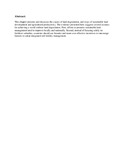Location
Our Vision is to be a world-class university committed to scholarly excellence.
Our Mission is to provide quality university education and training and to embody the aspirations of the Kenyan people and the global community through creation, preservation, integration, transmission and utilization of knowledge.
Core Values
In order to realize the above vision and mission, certain shared values shall be nurtured. There is great need for the University to be guided by the right values derived from the virtues and moral standards of the Kenyan and wider society.
Core Functions
Teaching and Learning: The university offers innovative , relevant and market driven academic programmes , both at undergraduate and postgraduate levels with inbuilt quality control systems the university also provides an environment and policy framework for undertaking high quality and relevant research
Members:
Resources
Displaying 106 - 110 of 298Impact of land use on the distribution and diversity of entomopathogenic nematodes in Embu and Taita districts, Kenya
Natural entomopathogenic nematodes (EPNs) are considered as potential biological control agents against soil-borne insect pests. This study was conducted to determine the impact of land use on the distribution, occurrence and diversity of entomopathogenic nematode community. Isolation of EPNs was done using the baiting technique and application of morphological identification methods revealed presence of the genus Steinernema. Land use intensification negatively affected the occurrence and recovery frequency in soils of Embu and Taita districts.
Community Opinions on Wildlife, Resource Use and Livelihood Competition in Kimana Group Ranch Near Amboseli, Kenya
Kimana Group Ranch (KGR) is a critical wildlife dispersal area for Amboseli National Park in Kenya. But
irrigated agriculture in the group ranch is leading to increased conflicts and competition for land and other critical
resources. This study used semi – structured interviews with group ranch members on their interactions with wildlife,
resource use and access, land use changes and livelihoods. Most group ranch members practiced agriculture as opposed to
Distribution and diversity of pythium spp. in indigenous forests and adjacent farm lands in Taita and Embu districts in Kenya
Pythium is a water mould fungus which survive as a parasite, saprophyte or both. Pythium
spp. play important ecological services like recycling of both Carbon and mineral
nutrients for continued plant growth. Members of this genus are ubiquitous and found in
soil, water, plants and animal substrate. Spatial distribution and species diversity of
Pythium were studied with aim of determining the effects of intensive agricultural
practices on distribution and diversity. Agricultural intensification interferes with the
Challenges of strategy implementation at the ministry of state for development of Northern Kenya and other arid lands
Strategy implementation is the translation of chosen strategy into organizational action so as to achieve strategic goals and objectives. Strategy implementation is also defined as the manner in which an organization should develop, utilize, and amalgamate organizational structure, control systems, and culture to follow strategies that lead to competitive advantage and a better performance. The main objectives of this study were to investigate the challenges of strategy implementation in the ministry of Northern Kenya and other arid areas.
Land under pressure.
This chapter presents and discusses the causes of land degradation, and ways of sustainable land development and agricultural productivity. The evidence presented here suggests several avenues for achieving a world without land degradation. First, efforts to promote sustainable land management need to improve locally and nationally. Second, instead of focusing solely on fertilizer subsidies, countries should use broader and more cost-effective incentives to encourage farmers to adopt integrated soil fertility management.






